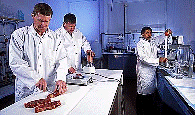United States Department of Agriculture: Agricultural Research Service, Lincoln, Nebraska

Roman L. Hruska U.S. Meat Animal Research Center: Reports
Date of this Version
1993
Document Type
Article
Abstract
The specific biological mechanisms that control pubertal development, testicular growth and onset of sperm production in the beef bull have not been well defined. It is known that two protein hormones (the gonadotropins, LH and FSH) produced by the pituitary stimulate testicular growth, cause an increase in numbers of testicular receptors for LH and FSH, and stimulate production of steroid hormones by the testes. Researchers have shown that the patterns of LH and FSH secretion diverge during the peripubertal period in several species, including the bull. While LH increases during the peripubertal period of development in the bull, FSH exhibits little change during this period. Inhibin, a protein hormone produced by the testes, has been shown to selectively inhibit FSH secretion in other species. Thus, inhibin may explain the divergence in peripubertal patterns of LH and FSH secretion in the bull and may be an important regulatory factor in bovine testicular development.
In other species, immunization of males against endogenous inhibin has been shown to influence secretion of FSH and testicular function. Structurally, the inhibin molecule in various species is composed of two protein chains termed the alpha and the beta chains. Each protein chain is composed of numerous amino acids, but the sequence of amino acids in the alpha chain contributes to inhibin's unique hormonal properties and species specificity. Thus, immunization against inhibin is usually performed by utilizing the alpha chain to induce immunological specificity against inhibin. Immunoneutralization of endogenous inhibin has been shown to cause increased secretion of FSH in rats, and similar immunization in rams has resulted in increased FSH, LH, testis size, daily sperm output and epididymal sperm reserves. Although inhibin is present in peripheral blood of bulls, the role of inhibin in regulation of gonadal growth and function in bulls is unknown. Therefore, the objective of the present experiment was to determine the importance of inhibin in regulation of secretion of FSH, LH and testosterone, testicular growth, and/or sperm production in young beef bulls.


Comments
Published in Beef Research Program Progress Report (1993) No. 4 (Part 1): 93-95